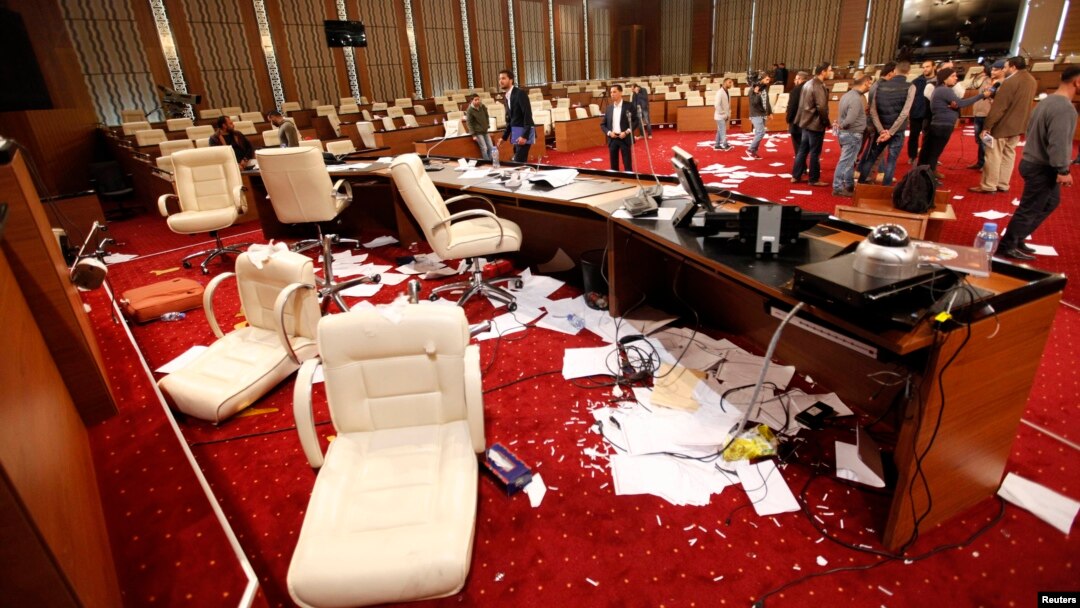CAIRO —
Libyan militiamen stormed the country's national assembly overnight, beating and shooting a number of MPs. Both the interim government and U.N. mission in Tripoli are warning militiamen not to resort to violence over political disputes.
Libyan state TV announced the names of six members of the interim national assembly who were wounded when militiamen stormed the assembly's headquarters. The station showed footage of minor damage to the conference hall, and graffiti on the wall.
One assembly member, Ala'a Magarief, describes what happened during the assault. He said 75-90 assembly members were sitting down and holding their session and within seconds, the hall was stormed without warning.
The Libyan interim government issued a statement on its official website insisting that citizens “have the right to demonstrate and hold peaceful sit-ins,” but that they must “refrain from resorting to violence.” The U.N. mission in Libya (UNSMIS) urged Libyans “not to use violence.”
Libya's defense ministry said Monday that it was “assuring the safety of parliament” and protecting its headquarters. Interim speaker Nouri Bou Sahmein said the body would meet Monday afternoon, but at a different location. Members of the interim government are due to brief the assembly, although Prime Minister Ali Zeidan is on an official visit to Rome.
Al Arabiya TV reported that protesters outside the General National Assembly headquarters “may have resorted to violence after someone set their sit-in camp ablaze.” Amateur video showed a fire burning in a parking lot outside the building and later video of torched vehicles.
Ahmed al Atrash, who teaches political science and international relations at the University of Tripoli, says he's not expecting any serious violence in the country, since everyone is armed and it is in no one's interest to start a conflict.
"Power and guns are not centralized in one hand in Libya," he said. "It's everywhere, you know. There's a kind of balance of power in Libya, now. I mean, everybody is aware of the other. That's what I see even in the Libyan streets. People all have guns, but they don't use [them] that much, because they know that the others might react."
Libyan state TV announced the names of six members of the interim national assembly who were wounded when militiamen stormed the assembly's headquarters. The station showed footage of minor damage to the conference hall, and graffiti on the wall.
One assembly member, Ala'a Magarief, describes what happened during the assault. He said 75-90 assembly members were sitting down and holding their session and within seconds, the hall was stormed without warning.
The Libyan interim government issued a statement on its official website insisting that citizens “have the right to demonstrate and hold peaceful sit-ins,” but that they must “refrain from resorting to violence.” The U.N. mission in Libya (UNSMIS) urged Libyans “not to use violence.”
Libya's defense ministry said Monday that it was “assuring the safety of parliament” and protecting its headquarters. Interim speaker Nouri Bou Sahmein said the body would meet Monday afternoon, but at a different location. Members of the interim government are due to brief the assembly, although Prime Minister Ali Zeidan is on an official visit to Rome.
Al Arabiya TV reported that protesters outside the General National Assembly headquarters “may have resorted to violence after someone set their sit-in camp ablaze.” Amateur video showed a fire burning in a parking lot outside the building and later video of torched vehicles.
Ahmed al Atrash, who teaches political science and international relations at the University of Tripoli, says he's not expecting any serious violence in the country, since everyone is armed and it is in no one's interest to start a conflict.
"Power and guns are not centralized in one hand in Libya," he said. "It's everywhere, you know. There's a kind of balance of power in Libya, now. I mean, everybody is aware of the other. That's what I see even in the Libyan streets. People all have guns, but they don't use [them] that much, because they know that the others might react."



